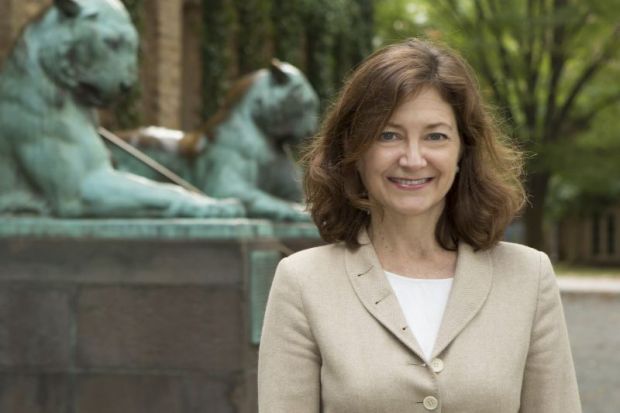Despite working at Princeton University for her entire 34-year academic career, Deborah Prentice is still sometimes seen as an outsider.
Such is the tribalism at elite institutions, the outgoing provost – who has held every position on the academic ladder at Princeton – was educated at Stanford University, then studied her PhD in psychology at Yale University and therefore, in the eyes of some, can never truly be “one of us”.
It may be harder still to shake such outsider status at the University of Cambridge, where Professor Prentice has been named the 347th vice-chancellor, particularly as, unlike her predecessors, she is going in at the top having had no experience studying or teaching at the institution.
This lack of insider knowledge matters greatly to some – the Cambridge culture is “thick with custom and she will offend with every slip”, according to Gill Evans, emeritus professor of medieval theology and intellectual history at Cambridge, who pointed out that the university has almost as many written rules as unwritten ones, with its statutes and ordinances currently filling 1,161 pages.
Professor Prentice’s appointment also stands in marked contrast to the direction taken by Cambridge’s great rival, the University of Oxford, which earlier this year appointed Irene Tracey, master of Merton College, Oxford, as its next vice-chancellor, in a move that was seen by some as a tacit acknowledgement that appointing outsiders had not worked.
But friends emphasised Professor Prentice’s internationalist approach, commitment to academic rigour and her many years running an elite institution that was inspired by the Oxbridge model to show she is well placed to get to grips with Cambridge and make a difference.
“She’s done almost everything you can do at Princeton...She’s been a faculty member then she became chair, dean and provost,” said Betsy Levy Paluck, a psychology professor at the university who was mentored by Professor Prentice.
“She couldn’t know how to run a university better; she’s really lived in all these different roles, and she knows them very well. I knew that whichever university she went to next, she’d have tremendous understanding and empathy for all the different kinds of people who she works with.”
While previous Oxbridge outsiders have run into difficulties because they have arrived with an agenda to shake things up, Professor Prentice will have no such ambitions, according to those who have worked closely with her.
“She’s not a revolutionary. She is not someone who will come in and overturn the apple cart immediately. She respects tradition, she understands it and she knows change happens by accretion; when it is necessary and when there is enough groundswell of support,” said Jill Dolan, dean of the college at Princeton, who has worked closely with Professor Prentice for the past 14 years.
Dale Miller, professor of organizational behaviour at the Stanford Graduate School of Business, who has collaborated with Professor Prentice on research, agreed. “My sense is she will be looking for ways to improve the institution that will have broad consensus. She’s not easily intimidated but neither is she somebody who seeks out a confrontation,” he said.
Cambridge is further along the process of reform than when previous vice-chancellors took the helm and Professor Prentice will understand where others faced pitfalls, according to the economist William Janeway, who has studied and worked at both Cambridge and Princeton and is friends with Professor Prentice and her husband, Jeremy Adelman, a history professor.
There was now a “gradual recognition that change has enabled Cambridge to remain at the forefront of global research universities”, he said, adding that she will also benefit from having seen Princeton evolve slowly, but substantially, during her time there.
This pragmatic approach has also had its critics. Her time at the top of Princeton has included the sacking of Classics professor Joshua Katz, who had criticised fellow academics demanding progress on racial equality, and former US president Woodrow Wilson’s name being removed from the School of Public and International Affairs because of his “racist thinking”. This record, combined with her research interests in gender stereotypes, has led Professor Prentice to being branded “woke” in some quarters.
Philosophy lecturer Arif Ahmed, who led the backlash against former vice-chancellor Stephen Toope’s “respect” reforms, said the incoming leader will be “aware that there is a very strong mandate in support of freedom of speech and academic freedom” at the institution and that “should be respected”.
Professor Prentice would reject the “woke” label, however, according to Professor Miller, although he said: “She would be concerned if she saw Cambridge to be out of touch with broader societal concerns.”
The psychologist is more likely to use her intellectual background to try to bring people together and understand the different approaches people take, Professor Paluck added.
“She’s a very keen observer of people’s environments and trying to understand their immediate and historical context. This is the way she leads; she thinks about all of these factors together and looks at things with an ethnographer’s eye,” Professor Paluck said.
The fact that she wanted the position at all is evidence that Professor Prentice is serious about applying her talents to helping universities change for the better, according to friends.
“She could have easily got a position as a university president in the US,” said Professor Miller. “After the pandemic it feels like all senior administrators are retiring so there are lots of opportunities. But this feels like a different challenge for her; she didn’t want to continue the trajectory she was on.”
POSTSCRIPT:
Print headline: New Cambridge v-c ‘will see where others faced pitfalls’
Register to continue
Why register?
- Registration is free and only takes a moment
- Once registered, you can read 3 articles a month
- Sign up for our newsletter
Subscribe
Or subscribe for unlimited access to:
- Unlimited access to news, views, insights & reviews
- Digital editions
- Digital access to THE’s university and college rankings analysis
Already registered or a current subscriber? Login








